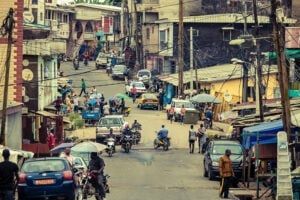Live facial recognition is now in place across Douala, Cameroon’s largest city, in a move designed to reduce urban crime rates. Over 3,000 video surveillance cameras have been installed as part of the project according to reports, alongside 95 base stations, two command and control centres and eight regional centres.
The project is a partnership between Cameroon Telecommunications (CAMTEL) and the National Delegation for National Security (DGSN), with technical support from Chinese tech company, Huawei. Switching on the project on Thursday 15 June, the cameras are said to capture all forms of crime, traffic incidents and disruption, while “crowds will no longer be anonymous”. It is expected that the project will be extended in all 10 regions of the country, via a total of 5,000 cameras linked to 17 command rooms.
According to BiometricUpdate.com, part of the DGSN document says that “Each image will be processed in real time by facial recognition algorithms enriched by information collected on different platforms”. ANPR will also be put into use, as well as software designed to “detect human actions and predict harmful behaviour”.
Speaking during the unveiling of the project, CAMTEL’s General Manager, Judith Yah Achidi, cited that the works are “aimed at reinforcing the security disposition of the nation… in a bid to help preserve the security of persons and properties”. Crime rates are reportedly high in the city of Douala, with “mugging and armed robbery” cited as common problems, among others, on the UK’s foreign office website.
The move is said to be part of the ‘Cameroon Intelligence Cities’ project, which is aiming to deploy AI-based technology across Cameroon to improve the lives of urban residents.
The capital city of Yaounde went live with the first part of the video surveillance project in 2019. The hope is to strengthen the operational capacity of the police to better monitor and counter crime, terrorism and traffic incidents.
Much like elsewhere in the world however, questions remain over the use of AI-based biometric detection and collection and privacy rights. As highlighted on BiometricUpdate.com, critics are concerned about data privacy, particularly as the country has no specific legislation focused on personal data protection. It has been noted that there has been no explanation as to how biometric data will be collected, or whether a human rights impact assessment has or will be carried out.
There are further fears over how the surveillance project could be used to target peaceful protects or identify opposition protest leaders.








